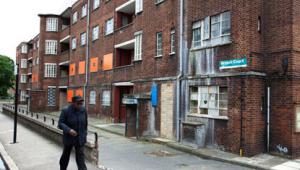29 October 2010
The government misjudged the opposition from Conservative London councils to its social housing cuts, a leading public policy expert has told Public Finance.
Last week’s Spending Review increased social housing rents to 80% of market rates, from an average of 40%. This followed an announcement in June’s emergency Budget that Housing Benefit would be capped at £400 a week for a large family house.
But Tory-run councils, as well as Labour authorities, have claimed that changes will lead to long-term social housing tenants having to leave their homes. Lynne Hillan, the Conservative leader of the London Borough of Barnet, said in a letter to Local Government Secretary Eric Pickles that residents will ‘fall into arrears and face eviction, leading to an increase in the numbers of homeless families’.
Conservative London Mayor Boris Johnson also weighed into the debate this week, warning that the move could lead to ‘Kosovo-style social cleansing’ of parts of the capital.
Tony Travers, director of the Greater London Group at the London School of Economics, told PF that the changes were ‘no more radical than GP commissioning or the abandonment of regional planning’. Opinion polls have shown that the public supports stern policies towards welfare benefits, he said.
However, he added: ‘Where ministers may have made a mistake is underestimating the response from inside London from Conservative politicians because they have managed to aggravate inner London Tory MPs, outer London Conservative leaders and the mayor. That is a political miscalculation, no matter what you think of the policy in humane terms.
‘They cannot aggravate these councils too much as they are the activist base of the party. The Conservative Party already have problems in London and I think that is the calculation Boris Johnson made. He has taken a view that is well away from the view of the national politicians.’
Travers said the speed of the reforms has been the controversial element of the policy. ‘If the government had proposed to bring about change over 20 years, or even 10, it would not have seemed so shocking. Then you can avoid the problem of children having to move schools, for example, so you give people time to get used to the change.’
Neil Stubbings, deputy director of adult social care and housing at the Tory-run London Borough of Hillingdon in outer London, told PF that inner London boroughs are already taking up private-rented accommodation in Hillingdon to house their own residents.
‘Because Hillingdon has slightly lower rents, other boroughs will be looking at the private rented sector here.
‘The government says it expects the market to adjust and does not expect to see large-scale movement. This may be right, but I don’t know how it can be so sure – it is complete crystal ball gazing,’ he added.
At Prime Minister’s Questions this week, David Cameron defended the coalition’s housing proposals.
‘Housing benefit for working-age people over the last five years has gone up by 50%. This is a budget that is completely out of control,’ he said.
‘The proposals we are bringing forward are difficult, but they need to be done, not least because we want to make sure that we protect the schools budget. We want to make sure that we protect the NHS budget. That is why we are taking difficult decisions about welfare.’
PF last week reported concerns over increases to the Housing Benefit bill, despite the introduction of caps because of the increase in social housing rents.




















